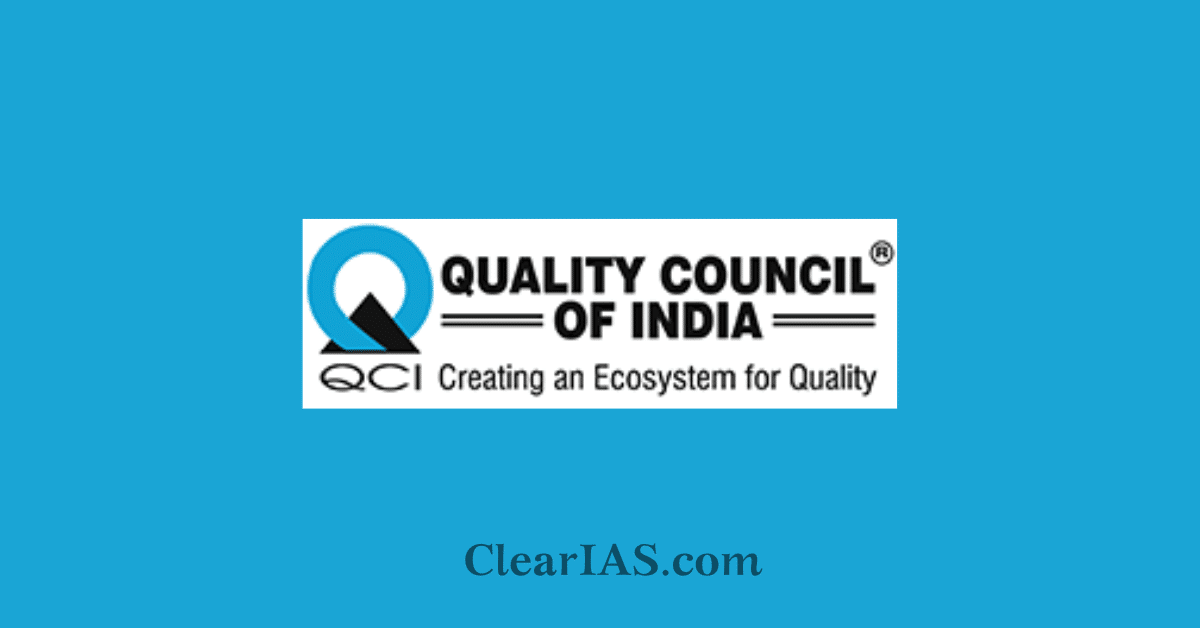
Quality Council of India (QCI) was established as a National body for Accreditation in 1996. It was set up to establish and promote quality standards across all social and economic sectors. Read here to know more about QCI.
Quality Council of India (QCI) was established as a National body for Accreditation on recommendations of the Expert Mission of the EU after consultations in the Inter-ministerial Task Force, Committee of Secretaries, and Group of Ministers through a Cabinet decision in 1996.
- The QCI has launched a campaign, ‘Gunvatta Se Atmanirbharta: India’s Quality Movement’to celebrate India’s quality hubs, create awareness about India’s landmark achievements and inform people about initiatives to enhance the quality of life of all citizens.
QCI was set up through a PPP model as an independent autonomous organization with the support of the Government of India and the Indian Industry represented by the three premier industry associations:
- Associated Chambers of Commerce and Industry of India (ASSOCHAM)
- Confederation of Indian Industry (CII) and
- Federation of Indian Chambers of Commerce and Industry (FICCI)
QCI is a non-profit organization registered under the Societies Registration Act XXI of 1860.
The Department of Industrial Policy and Promotion, Ministry of Commerce and Industry was designated as the nodal point for all matters connected with quality and QCI to structure and help implementation of the Cabinet decision.
QCI has been established to create a mechanism for independent third-party assessment of products, services, and processes.
- It plays a pivotal role at the national level in propagating, adopting, and adhering to quality standards in all important spheres of activities including education, healthcare, environment protection, governance, social sectors, infrastructure sector, and other areas of organized activities.
History of Quality Council of India
Since 1992, it has been considered that the government needs to establish an accrediting agency to create a system for the worldwide recognition of conformity assessment results.
- An accreditation body under the Ministry of Science & Technology was already functioning in laboratories.
- A committee that included various interested ministries and stakeholders including industries was established to make suitable recommendations.
- The work was coordinated by the then Department of Industrial Policy & Promotion – DIPP (now “Department for Promotion of Industries and Internal Trade” – DPIIT) and the recommendations were submitted to the Cabinet in 1996.
Key recommendations included “the need for establishing an organization jointly by the Government and the industry” and “the need for the organization to be self-sustaining and be away from the government”.
- Accepting the recommendations, the Cabinet Committee decided to set up the Quality Council of India as a non-profit autonomous society registered under the Societies Registration Act XXI of 1860.
- The aim was to establish an accreditation structure in the country and spread the quality movement in India by undertaking a National Quality Campaign.
Mission: To lead a nationwide quality movement in India by involving all stakeholders for emphasis on adherence to quality standards in all spheres of activities primarily for promoting and protecting the interests of the nation and its citizens.
Vision: Creating an eco-system for Quality
Objectives of Quality Council of India
To achieve the Mission of QCI, the objectives include:
- To lead a nationwide quality movement in the country through the National Quality Campaign aimed at creating awareness amongst citizens, empowering them to demand quality in all spheres of activities.
- promoting and protecting their well-being by encouraging manufacturers and suppliers of goods and service providers to the adoption of and adherence to quality standards and tools.
- To develop appropriate capacities at the level of Governments, Institutions, and enterprises for implementing & institutionalizing continuous quality improvement.
- To develop, establish & operate National Accreditation programs by the relevant international standards & guides for the conformity assessment bodies certifying products, personnel, management systems, carrying out inspection testing, calibration & medical laboratories, proficiency testing providers, reference material producers & test facilities adhering to OECD Principles of Good Laboratory Practices.
- To develop, establish and operate National Accreditation Programmes for various service sectors such as education, healthcare, environment protection, governance, social sectors, infrastructure sector, vocational training, etc., based on national/ international standards and guidelines
- where such standards are not available, to develop accreditation standards to support accreditation programs.
- To build capacities in the areas of regulation, conformity assessment, and accreditation to overcome TBT/SPS constraints;
- To establish and maintain strong linkages with international and regional fora such as International Laboratory Accreditation Cooperation (ILAC), International Accreditation Forum (IAF), Asia Pacific Laboratory Accreditation (APLAC), Pacific Accreditation Cooperation (PAC), International Society for Quality in Healthcare (ISQua), Organization for Economic Cooperation and Development (OECD), etc.
- To participate in Plenary Sessions, Committee Meetings, etc. to keep pace with the latest development and for promoting Multi-lateral Recognition Arrangements/Mutual acceptance of Data and
- To undertake all the activities which promote Bi-lateral/ Multi-lateral Recognition Arrangements between QCI/ Constituent Boards and Accreditation Bodies in other countries.
- To encourage the development & application of third-party assessment models for use in government, regulators, organizations, and society.
- To promote quality competitiveness of India’s enterprises, especially MSMEs through the adoption of and adherence to quality management standards and quality tools.
- Promoting the establishment of a quality improvement and benchmarking center, as a repository of best international/national practices and their dissemination among the industry in all sectors.
- To encourage industrial/applied research and development in the field of quality and dissemination of its result in relevant publications and trade journals;
- Publish books, literature & periodicals and disseminate information related to the objectives of QCI.
- To organize/participate in trade fairs, exhibitions, seminars, etc. at National & International fora.
- To build capacities including the development of appropriate quality accreditation mechanisms for other emerging areas such as the food sector, oil & gas, forestry, agriculture /animal husbandry, warehouse, pharmacy, etc.
- To facilitate the effective functioning of National Information & Enquiry Services on standards & quality including an appeal mechanism to deal with unresolved complaints.
- To develop and operate an appeal mechanism to deal with unresolved complaints.
Composition:
It is governed by a Council of 38 members with equal representation of government, industry, and consumers.
The Chairman of the Quality Council of India (QCI) is appointed by the Prime Minister on the recommendation of the industry to the government.
Key contributions of the Quality Council of India
- Transformed the quality assessment of the coal sector by undertaking initiatives like a third-party sampling of coal, there was a transformative improvement in quality in the sector.
- By collaborating with FCI, the process of distribution of these food grains was now completely technologically enabled using biometrics and under the One Nation One Ration Card (ONORC), beneficiaries could pick up their food from anywhere in the nation.
- The One District One Product (ODOP) initiative, which encourages items from distant areas to find markets in India and overseas, has also benefited greatly from QCI’s contributions.
- Additionally, QCI made a big contribution to the Swacch Surveykshan’s completion as well as the GI tagging program.
- QCI contributed to measuring the number of toilets built under the Swachh Bharat Mission
- Assessed the quality of electricity delivered in villages and houses constructed under PM Awas Yojana
- Supervised the gas cylinders delivery under the Ujjwala Yojana
-Article written by Swathi Satish







Leave a Reply